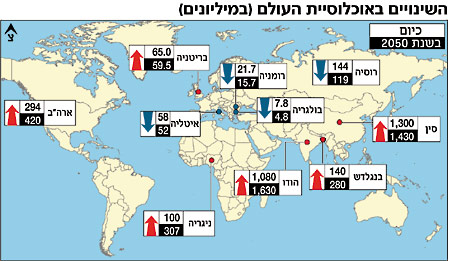Are the Bulgarians disappearing from the world?
John Vidal, Guardian, Haaretz

Direct link to this page: https://www.hayadan.org.il/population2050.html
The world is facing sharp fluctuations in the size of the populations in the various countries in the next 45 years; During this period, the number of residents in rich countries is expected to decrease and, in contrast, the size of the population in most developing countries will grow at a dizzying speed - according to a report published on Tuesday by the American Institute for Demographic Research Population Reference Bureau (PRB).
The authors of the report predict that by 2050 there will be an increase of one billion people in the world's poorest countries in Africa; There will also be 120 million more Americans, and India will surpass China in terms of population size - and become the most populous country in the world. On the other hand, the population of some countries will shrink: based on several factors, including birth and death rates, Bulgaria is expected to lose almost 40% of its population and Romania will lose 27%.
The changes, which the researchers see as inevitable given the current trends, will change the geopolitical relations and will have a substantial impact on the world economy, on the way of life of the people and on the global resources.
Britain, according to the report, is expected to grow faster than any other large country in Europe: the authors of the report predict that within 20 years there will be four million more people in Britain. At this point, Britain's growth is expected to slow down, and in the next 25 years, only 1.5 million people are expected to be added to its population, which will eventually amount to a population of 65 million people.
Countries such as Nigeria and Japan, which today have populations of similar size - about 130 million people - may undergo a dramatic change by 2050 that will change them beyond recognition, according to the authors of the report. By then, Nigeria's population is expected to more than double compared to today, to 300 million people. But Japan, where only 14% of its population is now under the age of 15, may shrink to only 100 million people by then.
Among the main industrialized countries, only the USA will grow significantly, according to the authors of the report. By 2050, the US population is expected to reach 420 million people, an increase of 43%. But Europe is expected to have 60 million fewer people than today, and some countries may lose more than a third of their population. Eastern Europe leads the list of countries whose population will shrink. In Bulgaria, the population is expected to decrease to the dimensions of before 1914, after losing 38% of its inhabitants. Romania will decrease by 27% and Russia will lose 25 million people. Germany and Italy are expected to shrink by about 10%.
The forecasts are based on a detailed analysis of infant mortality rates, age cutoff, population growth, life expectancy, income, and fertility rates. They take into account the rate of women using contraceptives and the rates of AIDS, but do not consider environmental factors. Climate changes and deterioration in the quality and quantity of land are expected to cause considerable movement of people - and cause migration from agricultural areas to rich countries.
The population changes worry experts, who believe that the continuous growth in the developing countries can only be dealt with with the help of financial aid from the rich countries. "The world's population is facing considerable growth in some of the most vulnerable countries in the world. We have to ask how the rich countries intend to help them," said Kirstin Shrek, from the American Family Planning Federation. Former World Bank economist Herman Daly believes that globalization and uncontrolled migration of cheap labor can cause catastrophic pressures on local communities and the economies of countries: "The absolute number of people on the planet is far greater than at any time in history"
https://www.hayadan.org.il/BuildaGate4/general2/data_card.php?Cat=~~~929402880~~~216&SiteName=hayadan
